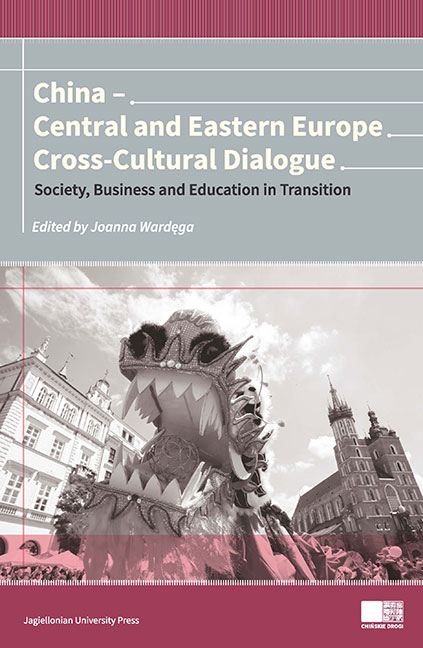Book contents
- Frontmatter
- Contents
- Foreword
- PART I Society and Culture in Transition
- Idealism and Relativism in Ethics: Comparing China and Central Eastern Europe (CEE)
- China's Role in the New World Order
- Redefining and Elderly Caregiving in the 21st Century China and Poland
- Roadmap for Moving to a Low Carbon Economy in China and Poland. Comparative Analysis
- Chinese Community in Poland – the Dynamics of its Development
- Perceptions of China among Central and Eastern European University Students
- Transformation of the Dragon – China's Image in the Polish Media
- Bridges and Obstacles in “the Way of the Ideal Government”: the Transition from Mind Confucianism to Political Confucianism from Jiang Qing's Point of View
- Conceptualizations of Constitutionalism in Recent China's Debates: Preliminary Typologies
- PART TWO Economy and Markets in Transition
- PART THREE Education in Transition
- Contributors
Bridges and Obstacles in “the Way of the Ideal Government”: the Transition from Mind Confucianism to Political Confucianism from Jiang Qing's Point of View
from PART I - Society and Culture in Transition
Published online by Cambridge University Press: 22 December 2017
- Frontmatter
- Contents
- Foreword
- PART I Society and Culture in Transition
- Idealism and Relativism in Ethics: Comparing China and Central Eastern Europe (CEE)
- China's Role in the New World Order
- Redefining and Elderly Caregiving in the 21st Century China and Poland
- Roadmap for Moving to a Low Carbon Economy in China and Poland. Comparative Analysis
- Chinese Community in Poland – the Dynamics of its Development
- Perceptions of China among Central and Eastern European University Students
- Transformation of the Dragon – China's Image in the Polish Media
- Bridges and Obstacles in “the Way of the Ideal Government”: the Transition from Mind Confucianism to Political Confucianism from Jiang Qing's Point of View
- Conceptualizations of Constitutionalism in Recent China's Debates: Preliminary Typologies
- PART TWO Economy and Markets in Transition
- PART THREE Education in Transition
- Contributors
Summary
Ever since the dawn of the Chinese culture, great thinkers such as Mencius and Xun Zi expressed their concern for an ideal way of government. In this study we aim at pointing out why such ideas could not take the intended shape, whether they could have even been possible, and how these ideas were taken over and developed by our contemporary prominent promoter of “Political Confucianism” – Jiang Qing.
Jiang Qing, the centerpiece of our study, is the kind of thinker that went through different stages in his academic career as well as his intellectual pursuit. He puts forward a set of theories which promote a view on Chinese culture that looks upon its origins after hovering around for many decades, going as far as to demonstrate why Western liberal democracy could never work in China.
His critical approach to the “Mind Confucianism” that rose outside mainland China after 1949, obviously soaking in many Western ideas, underlines notions such as individuality, concern for the metaphysical and transcendent, undervalue of law and ritual, all of which mainly disconnected Confucianism from the real and historical China. That is why he leads the transition to a so called “Mainland China New Confucianism”, which stresses the importance of the second half of the Confucian ideal, of the “outer king” (wai wang 外王) who should take precedence over “the inner sage” (nei sheng 内圣).
Fundamental concepts like equality, human dignity, universal values or global ethics are critically discussed in many of Jiang Qing's works as well as in those of his critics. Thus, the many bridges between cultures sketched by thinkers on both sides of the Pacific (the Atlantic as well), along with the obstacles, are all just instances of vision and interpretation, and Jiang Qing spares no effort in stating his different views on these constructs. Nevertheless, there are many interesting connections to be analyzed between morality and governance, the transcendent and the immanent, the ideal and the real realm of society and culture.
Nowadays, liberal and democratic regimes face serious problems that can also point to the difference between the ideal kind of government and a pragmatic one, with roots in the history and tradition of the Chinese culture, on one side, and the European culture on the other, closely related to the changes that emerged within the last decades.
- Type
- Chapter
- Information
- China - Central and Eastern Europe Cross-Cultural Dialogue Society, Business and Education in Transition , pp. 141 - 154Publisher: Jagiellonian University PressPrint publication year: 2016



